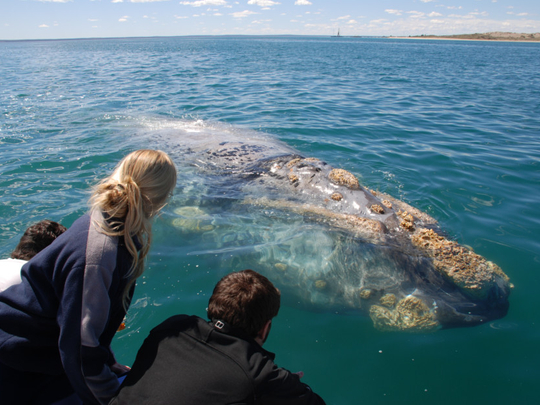
Nearly three billion people globally rely on fish as a major source of protein. However, fish population that is essential for food have been reduced by half in the last four decades, as stated by the latest edition of the Living Planet Report published by the World Wide Fund for Nature (WWF).
The report goes on to state that around one in four species of sharks and rays is now threatened with extinction, primarily due to overfishing.
Niru Neil Dorrian, co-founder of Whalefish, a global network of scientists dedicating their time to conserving marine wildlife, spoke to Gulf News about the depletion of natural resources.
He said: “One of the major issues is the multitude of human activities, which are exploiting the natural environment. It could be the extraction of oil and gas, the reclamation of land from the sea for human expansion, the destruction of mangrove forests for waterfront developments, overfishing practices and the dumping of waste at sea. We all contribute to this depletion considering the developed world is focused on consumerism.”
Dorrian, who is a marine mammal biologist, highlighted some of the marine life facing threat.
He said: “Many species of shark are declining due to overfishing, while the shark fin trade is staggering with the average estimated range of around 38 million sharks killed per year, according to saveourseas.com. The Vaquita porpoise is a species in the northern part of the Gulf of California. In July 2014, acoustic data showed that the number of this species have dropped below 100 individuals, making it currently the most endangered marine mammal in the world. In the 1950s, the Baiji Dolphin’s population was estimated at 6,000 individuals and in 2006 it was declared functionally extinct.”
Each fish species has a unique reproductive cycle and favours certain habitats for spawning.
Dorrian said: “Many fish species use shallow waters as spawning habitat. Some prefer mangrove forests with aquatic vegetation. Others prefer shallow reefs, which provide rich areas for food and rocky structure to protect the eggs. Fish life cycles vary among species but in general fish progress through certain stages. First is an egg with fertilised eggs developing into fish. Second is larval with larval fish living off a yolk sac attached to their bodies. When the yolk sac is fully absorbed, the young fish in the third stage are called fry. They are ready to start eating on their own and undergo several developmental stages, as they mature into juvenile and finally adults, which is when they are ready to reproduce.”
But, man is claiming mangroves and destroying reef systems - all to build for himself. This means these fish have nowhere to spawn, grow and populate.
Littering is also a major concern, as the WWF states that there is more than five trillion plastic pieces weighing over 250,000 tonnes in the sea around the world.
Dorrian said: “Biological and chemical pollutants enter the water system and cause devastating health complications for the entire ecosystem. Plastic materials are particularly problematic as they do not biodegrade but take hundreds of years to photodegrade into smaller particles making them impossible to remove from the bionetwork. Plastics are found in fish, seabirds, turtles and marine mammals and can cause suffocation and blockages in the digestive system and can rupture internal organs. Entanglement in marine debris is an ever-increasing threat to the oceans’ inhabitants, one of the most fatal culprits being fishing gear.”
Gulf News readers are witness to this issue with Arushi Madan, a student based in Sharjah, being one of them. She has often witnessed people littering at beaches in the emirate.
She told Gulf News: “People visit the Buhaira Corniche or Al Mamzar beach and leave litter behind irresponsibly. They will throw packets or cans in the water or on the shore. They should instead carry disposable bags to throw waste. People need to change their attitude towards the environment.”
When asked how often her family consumed fish, Madan clarified that they are vegetarians.
She said: “Unsustainable fishing practices have lead to a decline in key fish species and damage to the ecosystem. In the UAE, we find that the most common fish being eaten are hammour, the grouper fish. Very few people know that its numbers are declining fast. According to the Environment Agency-Abu Dhabi (EAD), these fish are being hunted down seven times in excess of sustainable levels. Picking the right fish to eat may help save some of the ocean’s most endangered species.”
Roopa Bhat Jacob, a homemaker based in Dubai, urges the authorities to be strict about littering on beaches.
She said: “I have seen beaches in Dubai littered mostly with cigarettes, cans and plastic bags, which are harmful to the marine life. I do not eat fish, but my family members eat and when buying it, I am aware that hammour is the most exploited species. A consumer must make a conscious choice, keeping in mind the bigger picture rather than the taste.”
Haseeb Haroon, a Dubai resident, has been sold fish that looks like hammour but tastes different.
He said: “It is obvious that there is a serious depletion of hammour to the extent that the hawkers at the fish market are selling another fish that looks a bit like it, but tastes different. I have been told by the workers in trawlers that there has been overfishing in the UAE waters, and it’s just a matter of time before they might come in empty handed.”
Humanity continues to make unsustainable demands on Nature, threatening the planet’s long term well-being. With such declines in the ecosystems, meeting the basic needs of a growing population may become a challenge in the near future.









